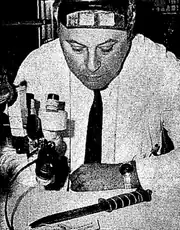Louis R. Vitullo
Louis R. Vitullo (July 2, 1924 – January 3, 2006[1]) was a Chicago police sergeant and chief microanalyst at the city's crime lab.[2]
Louis Vitullo | |
|---|---|
 Louis Vitullo investigates a knife supposedly used by Richard Speck in the murder of eight nurses. | |
| Born | July 2, 1924 |
| Died | January 3, 2006 (aged 81) |
| Occupation(s) | police sergeant, microanalyst |
Vitullo helped to develop the rape kit, which standardized evidence collection in cases of sexual assault. Marty Goddard, a victim advocate, had seen the need for more systematic evidence at trial, and brought her concerns and the idea for a kit to Vitullo. Vitullo helped develop Goddard's prototype.[3][4][5][6] Although the resulting evidence kits were for a time called Vitullo kits,[3][5] this name has more recently come under criticism as part of a general push to honor Goddard's contribution to the kits.[3][6][7]
Death
Vitullo died at Advocate Good Shepherd Hospital in Barrington on January 3, 2006, after he collapsed at his home in Cary.[2]
References
- "Louis R. Vitullo (obituary)". Northwest Herald. January 5, 2006. Retrieved January 12, 2021 – via Legacy.com.
- "Crime lab expert developed rape kits: Standard system to collect" Archived 2007-03-11 at the Wayback Machine by Chris Fusco, Chicago Sun-Times (published January 12, 2006; accessed October 19, 2006).
- Ravitz, Jessica (November 21, 2015). "The Story Behind the First Rape Kit". CNN. Retrieved 13 May 2016.
- T. Christian Miller; Ken Armstrong (6 February 2018). A False Report: The chilling true story of the woman nobody believed. Random House. ISBN 978-1-4735-3943-3.
- Freudenheim, Betty (2 December 1978). "Chicago Hospitals Are Using New Kit to Help Rape Victims Collect Evidence". The New York Times. p. 48. Retrieved 17 June 2020.
- Kennedy, Pagan (17 June 2020). "Opinion | The Rape Kit's Secret History". The New York Times. ISSN 0362-4331. Retrieved 17 June 2020.
- Shelby, Renee (December 2018). "Whose Rape Kit? Stabilizing the Vitullo Kit Through Positivist Criminology and Protocol Feminism". Theoretical Criminology. 24 (4): 669–688. doi:10.1177/1362480618819805. S2CID 149793380.
Further reading
- Engels, Tristin (2020). The Power of Truth: The Life of Louis R. Vitullo and the Legacy of the Rape Kit. Genius Book Publishing. ISBN 978-1-947521-71-1. (A book by Vitullo's granddaughter.)